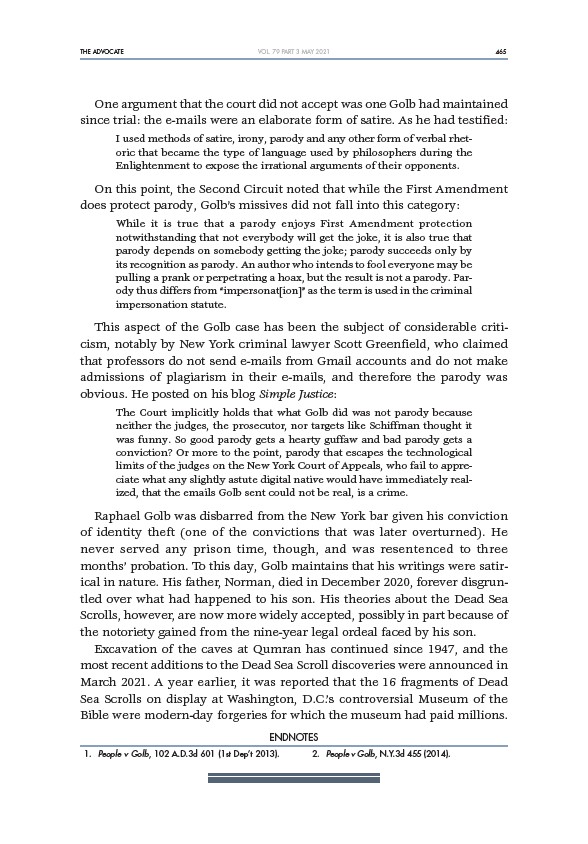
THE ADVOCATE 465
VOL. 79 PART 3 MAY 2021
One argument that the court did not accept was one Golb had maintained
since trial: the e-mails were an elaborate form of satire. As he had testified:
I used methods of satire, irony, parody and any other form of verbal rhetoric
that became the type of language used by philosophers during the
Enlightenment to expose the irrational arguments of their opponents.
On this point, the Second Circuit noted that while the First Amendment
does protect parody, Golb’s missives did not fall into this category:
While it is true that a parody enjoys First Amendment protection
notwithstanding that not everybody will get the joke, it is also true that
parody depends on somebody getting the joke; parody succeeds only by
its recognition as parody. An author who intends to fool everyone may be
pulling a prank or perpetrating a hoax, but the result is not a parody. Parody
thus differs from “impersonation” as the term is used in the criminal
impersonation statute.
This aspect of the Golb case has been the subject of considerable criticism,
notably by New York criminal lawyer Scott Greenfield, who claimed
that professors do not send e-mails from Gmail accounts and do not make
admissions of plagiarism in their e-mails, and therefore the parody was
obvious. He posted on his blog Simple Justice:
The Court implicitly holds that what Golb did was not parody because
neither the judges, the prosecutor, nor targets like Schiffman thought it
was funny. So good parody gets a hearty guffaw and bad parody gets a
conviction? Or more to the point, parody that escapes the technological
limits of the judges on the New York Court of Appeals, who fail to appreciate
what any slightly astute digital native would have immediately realized,
that the emails Golb sent could not be real, is a crime.
Raphael Golb was disbarred from the New York bar given his conviction
of identity theft (one of the convictions that was later overturned). He
never served any prison time, though, and was resentenced to three
months’ probation. To this day, Golb maintains that his writings were satirical
in nature. His father, Norman, died in December 2020, forever disgruntled
over what had happened to his son. His theories about the Dead Sea
Scrolls, however, are now more widely accepted, possibly in part because of
the notoriety gained from the nine-year legal ordeal faced by his son.
Excavation of the caves at Qumran has continued since 1947, and the
most recent additions to the Dead Sea Scroll discoveries were announced in
March 2021. A year earlier, it was reported that the 16 fragments of Dead
Sea Scrolls on display at Washington, D.C.’s controversial Museum of the
Bible were modern-day forgeries for which the museum had paid millions.
ENDNOTES
1. People v Golb, 102 A.D.3d 601 (1st Dep’t 2013). 2. People v Golb, N.Y.3d 455 (2014).